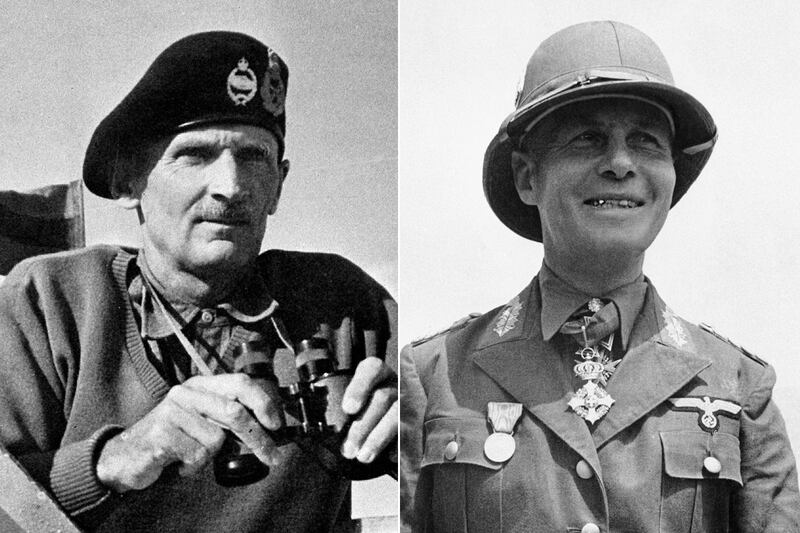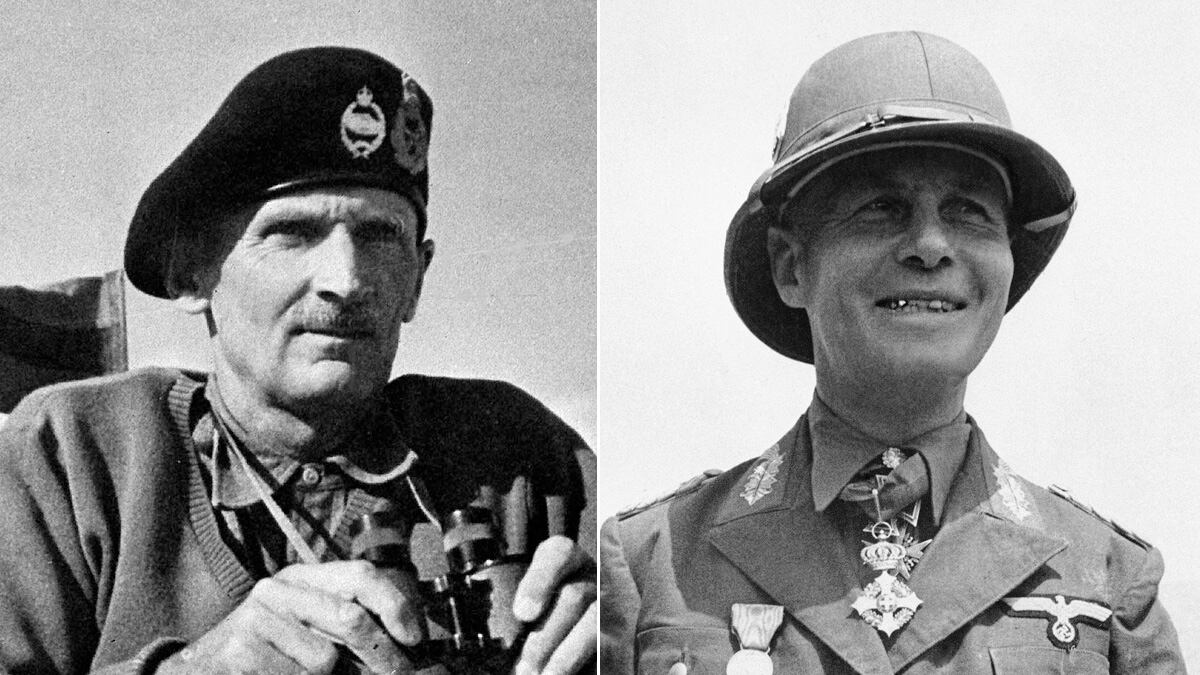To quote William Faulkner, “The past is never dead—it is not even past.” Of no great event is that more true than of World War II, in the shattered debris of which, politically speaking, we are still living, and the history of which we are still trying to make sense. Hence the seemingly endless stream of books about the war, a flood of which we only see a small part in this country and Britain since most of us do not read books about it in French, German, Russian, or Japanese. Of one thing we can be sure: in each of the major countries that fought in the war, its events and principal participants will be seen in a different light and from a very different perspective.
General (later Field Marshal) Bernard Montgomery tends to get relegated to the sidelines in American histories of the war as an interesting (and irritating) minor player, who failed to take Caen in the time he had promised in June 1944, and whose airborne attack on Arnhem in the autumn of 1944 failed to take the Rhine bridge there, and thus blotted out any hope of ending the war by Christmas 1944. For the British, despite his prickly personality and his embarrassingly venomous memoirs, Monty remains a major figure, their most successful general of the war, and the man responsible for the British victory at El Alamein against Rommel’s Afrika Korps, one of the major turning points of the war.
For Germans, General (later Field Marshal) Erwin Rommel is not only one of the most brilliant Panzer commanders of World War II, but also a valuable post-war icon. Here is one German general at last who is admired by both sides, who never served on the Eastern Front, who is untarnished by any kind of war crime, and who was obliged to commit suicide when he was connected with the July 1944 plot against Hitler—to paraphrase Voltaire’s famous bon mot about God, “S’il n’existait pas, il fallait l’inventer" ("If he did not exist, one would be obliged to invent him"). Dead, Rommel has played an even more important role in the recovery of Germany’s self-esteem than he did in the war as “The Desert Fox.”

Quite apart from its readability and very rare fair-mindedness, Peter Caddick-Adams’s Monty and Rommel—Parallel Lives helps to demonstrate one of the major difficulties of the United States in its present wars: we have no equivalent of an Ike or a Patton, nor of Monty or Rommel. The U.S. is committed to small wars, with no major battles or victories, in places nobody much cares about, and to relatively faceless bureaucrat-generals, whose strategy and tactics are rigidly controlled by the White House and the Defense Department down to the smallest detail. General David Petraeus, who despite a chest full of ribbons, which apparently include his marksmanship badges, does not have quite the dominating military presence of, say, Douglas MacArthur, nor the lofty independence of George C. Marshall or Dwight D. Eisenhower. As a four-star general he commanded just over 100,000 troops in Afghanistan, whereas Ike, with four stars on his shoulder on D-Day, had under his command more than 3,000,000 men (1.7 million Americans, 1 million British and Canadian, the rest Polish, French, and Dutch), and far from being micromanaged by e-mails, phone messages, and helpful hints from Washington, it was up to him to decide where to invade, when to invade, what to do once his troops got ashore, or what to say if the worst happened and they didn’t. Generals were generals in those days, not the military equivalent of a tailor’s dummy, wheeled out to impress senators and congressmen at briefings and committee meetings.
Once Rommel reached North Africa he fought his own battle, for the most part out of touch and out of reach of the OKW (the High Command of the Wehrmacht), and ignoring such advice and suggestions from the Führer that he received. Monty was equally difficult to reach—he isolated himself in his trailer surrounded by loyal staff officers and his pet canaries, and refused to have his regular mealtimes and eight hours of sleep disturbed by anyone. Even when the King visited him, he went to bed at 9 p.m., as usual, and left His Majesty to sit up chatting with the ADCs.
Caddick-Adams’s book brilliantly captures the lives and the personalities of these two extraordinary men, seamlessly switching from Rommel’s meteoric rise up the German chain of command, thanks in part to the fact that he commanded the Führer’s Army ceremonial guard, and thus had Hitler’s ear, and in part to his friendship with Karl Hanke, Goebbels's deputy in the Propaganda Ministry (and the lover of Goebbels's wealthy wife, Magda). None of this is to suggest that Rommel was a Nazi—he was not, but he was a skilled self-promoter, with a good sense of where the levers of power were in Nazi Germany. He was also a brave soldier, who wore the blue enamel and gold of the Pour le Mérite cross, the Imperial German equivalent of the Victoria Cross, and a brilliant and fearless leader of men. He also understood, and put into practice, the combining of armor, infantry, and artillery into a highly mobile unit in which each element supported the other, which brought him fame and victory in Poland in 1939 and France in 1940, but which turned sour in 1944, when he was forced into a defensive role.
Caddick-Adams is just as good, perhaps better, in describing Monty’s difficult, abrasive, and acerbic personality, and his much slower rise up the ranks in the more class-bound structure of the British Army, where he was regarded as something of a cad. Monty was as good as Rommel at training men, like Rommel he had proved his courage under fire in World War I, and been severely wounded. Also like Rommel he was an innovator, who brought to the desert in 1941 a new and much more daring and fast-moving combination of tanks, infantry, and artillery. Caddick-Adams is terrific at describing in detail the desert war in 1941-42, his account of it is military history at its best, breathless reading—and something which should be read right now in the White House and the Defense Department, since the cities over which Gaddafi’s forces and the rebels against them fought, were all fought over by the British and the Germans. Far from being unfamiliar places, Benghazi, Tobruk, and Tripoli had been fought over, lost, and captured again and again by the Germans and their reluctant Italian allies, and by Monty’s British, Australian, New Zealander, Indian, South African, and Free French army.
In short, Monty and Rommel is not only a first-class work of military history, but one of those books that makes you stop and think, and connect the dots from the past to the present. The author is masterful at bringing alive these two very different (and very difficult) personalities, and has scads of good stories about them, my favorite being that when Winston Churchill heard that Monty had invited General Von Thoma to his tent for dinner after the German surrendered in the desert, he said, recalling Monty’s famously abstemious dinners, “Ah, poor Von Thoma, I too have dined with Monty.”
He is, more importantly, terrific at explaining just exactly how Monty and Rommel fought each other in the Libyan Desert, and thoughtfully provides excellent maps.
Having met Monty—he visited my school in Switzerland, to have tea with the English boys—I can vouch for how well he catches Monty’s character. I can remember every minute of it, the high, sharp, piercing voice, the ghastly attempt to get matey with those of us who were seated around him at the tea table, the barely concealed impatience, the piercing eyes which missed nothing, and the endless, schoolmasterly good advice, a kind of malevolent, sharp-tongued Mr. Chips. When, two years later, I had to do my National Service and had to fill out a form that asked which service I would like to join, I firmly crossed out “Army” and put a circle around “Royal Air Force,” and never regretted it for instant.
Never mind, this is a terrific book, and well worth reading carefully. Unlike most military history it has a certain novelistic depth, and its two major characters are unfailingly interesting.






